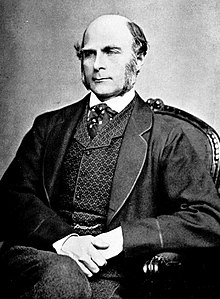
Back فرانسيس غالتون Arabic فرانسيس جالتون ARZ فرانسیس قالتون AZB Фрэнсіс Гальтан Byelorussian Френсис Галтън Bulgarian Francis Galton Catalan Francis Galton Czech Френсис Гальтон CV Francis Galton Danish Francis Galton German
Francis Galton | |
|---|---|
 Galton in the 1850s or 1860s | |
| Born | 16 February 1822 Birmingham, England |
| Died | 17 January 1911 (aged 88) Haslemere, Surrey, England |
| Resting place | Claverdon, Warwickshire, England |
| Alma mater | King's College, London Trinity College, Cambridge |
| Known for | Eugenics Behavioural genetics Regression toward the mean Standard deviation Anticyclone Isochrone map Weather map Galton board Galton distribution Galton–Watson process Galton's problem Galton's whistle |
| Awards | Royal Geographical Society's Founder's Medal (1853) Royal Medal (1886) Huxley Memorial Medal (1901) Darwin–Wallace Medal (Silver, 1908) Copley Medal (1910) |
| Scientific career | |
| Fields | Anthropology, sociology, psychology, statistics |
| Institutions | Meteorological Council Royal Geographical Society |
| Academic advisors | William Hopkins |
| Notable students | Karl Pearson |
| Author abbrev. (zoology) | F. Galton, Galton |
Sir Francis Galton FRS FRAI (/ˈɡɔːltən/; 16 February 1822 – 17 January 1911) was a British polymath and the originator of eugenics during the Victorian era; his ideas later became the basis of behavioral genetics.[1][2]
Galton produced over 340 papers and books. He also developed the statistical concept of correlation and widely promoted regression toward the mean. He was the first to apply statistical methods to the study of human differences and inheritance of intelligence, and introduced the use of questionnaires and surveys for collecting data on human communities, which he needed for genealogical and biographical works and for his anthropometric studies. He coined the phrase "nature versus nurture".[3] His book Hereditary Genius (1869) was the first social scientific attempt to study genius and greatness.[4]
As an investigator of the human mind, he founded psychometrics and differential psychology, as well as the lexical hypothesis of personality. He devised a method for classifying fingerprints that proved useful in forensic science. He also conducted research on the power of prayer, concluding it had none due to its null effects on the longevity of those prayed for.[5] His quest for the scientific principles of diverse phenomena extended even to the optimal method for making tea.[6] As the initiator of scientific meteorology, he devised the first weather map, proposed a theory of anticyclones, and was the first to establish a complete record of short-term climatic phenomena on a European scale.[7] He also invented the Galton Whistle for testing differential hearing ability.[8] Galton was knighted in 1909 for his contributions to science.[9] He was Charles Darwin's half-cousin.[10]
In recent years, he has received significant criticism for being a proponent of social Darwinism, eugenics, and biological racism; he was a pioneer of eugenics, coining the term itself in 1883.[11][12]
- ^ Langkjær-Bain, Robert (29 May 2019). "The troubling legacy of Francis Galton". Significance. 16 (3): 16–21. doi:10.1111/j.1740-9713.2019.01275.x. S2CID 191778398.
- ^ Gillham, NW (December 2001). "Sir Francis Galton and the birth of behavioral genetics". Annual Review of Genetics. 35: 83–101. doi:10.1146/annurev.genet.35.102401.090055. PMID 11700278.
- ^ Galton 1874, pp. 227–236.
- ^ Galton 1869.
- ^ Galton 1872, pp. 125–135.
- ^ Galton 1855, p. 208.
- ^ Cite error: The named reference
scienceworld.wolfram.comwas invoked but never defined (see the help page). - ^ Galton 1883.
- ^ "Page 5806 | Issue 28275, 30 July 1909 | London Gazette | The Gazette". www.thegazette.co.uk. Retrieved 9 March 2023.
"The KING has also been pleased, by Letters Patent under the Great Seal of the United Kingdom of Great Britain and Ireland, bearing date the 26th June, 1909, to confer the dignity of a Knight of the said United Kingdom upon: Francis Galton, Esq., Sc.D., F.R.S., Honorary Fellow of Trinity College, Cambridge" The London Gazette, 30 July 1909 (issue 28275), pp. 5805-5806.
- ^ Darwin 1887, p. 5.
- ^ "Sir Francis Galton · Galton's Children · OnView". collections.countway.harvard.edu. Retrieved 27 February 2024.
- ^ "The Origins of Eugenics | Facing History & Ourselves". www.facinghistory.org. 4 August 2015. Retrieved 27 February 2024.